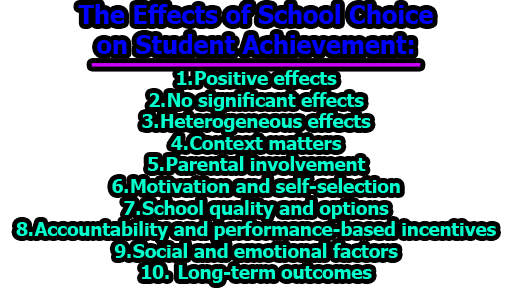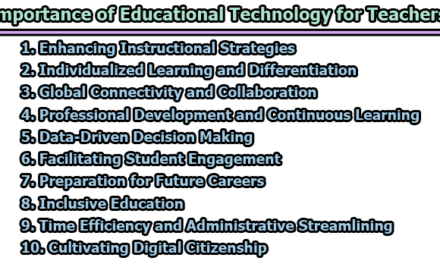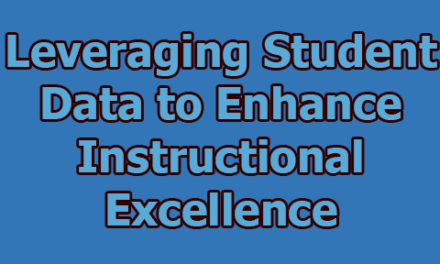The Effects of School Choice on Student Achievement:
The effects of school choice on student achievement have been a topic of significant debate and research in the field of education. School choice refers to the ability of parents or guardians to select the school that their child attends, which can include public, private, charter, or magnet schools. Proponents argue that school choice can lead to increased competition and innovation, which in turn improves the quality of education and student outcomes. However, critics express concerns about potential negative consequences, such as increased segregation and inequality. Research on the effects of school choice on student achievement has produced mixed findings, and the impact can vary depending on the specific context and implementation of school choice policies. Here are some key points from the available research:
- Positive effects: Several studies have shown positive associations between school choice and student achievement. Proponents argue that competition among schools incentivizes them to improve their instructional quality, leading to better outcomes for students. For instance, the aforementioned study by Caroline Hoxby and colleagues (2009) found that students who participated in a school choice program in New York City had higher test scores compared to their non-participating peers. Similarly, a study by Raj Chetty, John N. Friedman, and Jonah E. Rockoff (2014) examining data from New York City’s charter schools found that attending a charter school led to substantial gains in student achievement, particularly for disadvantaged students.
- No significant effects: On the other hand, some studies have found no significant difference in student achievement between those who exercise school choice and those who do not. For example, a study by Joshua Angrist and Parag Pathak (2013) examined the impact of charter schools in Boston and found no consistent evidence of significant test score gains for students attending charter schools compared to traditional public schools. Similarly, a review of the research literature conducted by the National Education Policy Center (NEPC) in 2017 found mixed and inconclusive evidence regarding the effects of school choice on student achievement.
- Heterogeneous effects: The impact of school choice can vary across different subgroups of students. Some studies suggest that disadvantaged or low-income students may benefit more from school choice than their more advantaged peers. This is because school choice can provide opportunities for these students to attend higher-performing schools that were previously inaccessible to them. However, there are also concerns that school choice may exacerbate inequalities by attracting more motivated and higher-performing students, leaving behind those who are less fortunate. The available evidence does not provide a clear consensus on the equity implications of school choice policies.
- Context matters: The effects of school choice can depend on the specific policies and implementation strategies in place. Factors such as the availability of high-quality school options, the level of competition among schools, the transportation options for students, and the regulations governing the choice system can all influence the outcomes. For example, research by Justine S. Hastings, Thomas J. Kane, and Douglas O. Staiger (2006) suggested that the introduction of charter schools in Massachusetts led to improvements in student achievement, but the impact varied depending on the level of competition between charter schools and traditional public schools.
It is worth noting that the effects of school choice on student achievement are difficult to isolate and measure accurately due to various confounding factors. Researchers employ different methodologies, and the results can be sensitive to the specific context and design of the study. Additionally, there is a need for long-term studies to understand the potential long-term effects of school choice on outcomes beyond test scores, such as graduation rates, college attendance, and career success.
In summary, while some studies show positive effects of school choice on student achievement, the research landscape is complex and nuanced. The impact can vary depending on factors such as specific policies, implementation strategies, student demographics, and the overall educational context. Further research is necessary to gain a deeper understanding of the relationship between school choice and student outcomes, as well as the equity implications of such policies.
Here are some additional points to consider regarding the effects of school choice on student achievement:
- Parental involvement: School choice can potentially increase parental involvement in their child’s education. When parents have the ability to choose their child’s school, they may be more engaged and invested in their child’s academic progress. Increased parental involvement has been linked to improved student achievement in various studies. By empowering parents to choose the best educational setting for their child, school choice may encourage greater parental engagement, which can positively impact student outcomes.
- Motivation and self-selection: School choice programs often attract families who are actively seeking better educational opportunities for their children. These families may be more motivated, and involved, and have higher expectations for their child’s academic success. Consequently, the positive effects observed in some studies may be partly attributed to the characteristics and motivations of the families who opt for school choice. It is essential to consider potential selection biases and confounding factors when interpreting the relationship between school choice and student achievement.
- School quality and options: The availability and quality of school options play a crucial role in determining the impact of school choice on student achievement. In regions where there are limited high-quality options, the benefits of school choice may be constrained. Conversely, in areas with a diverse range of high-performing schools, school choice programs may lead to improved student outcomes as families have more opportunities to select better-suited educational environments for their children.
- Accountability and performance-based incentives: School choice programs are often accompanied by increased accountability measures for schools. Schools participating in choice programs may face consequences, such as closure or loss of funding if they consistently underperform. The introduction of performance-based incentives and accountability measures can create stronger incentives for schools to improve their teaching practices and student outcomes. This can potentially contribute to overall improvements in student achievement.
- Social and emotional factors: While academic achievement is a crucial measure, school choice may also impact social and emotional factors that influence student well-being and success. For example, attending a school that aligns with a student’s interests, values, or educational philosophy can enhance their motivation, engagement, and overall satisfaction with the learning environment. Positive social interactions and a sense of belonging in a chosen school can also contribute to a student’s emotional well-being and academic performance.
- Long-term outcomes: The effects of school choice on student achievement may extend beyond immediate test scores. Some research suggests that school choice programs have positive long-term effects on outcomes such as high school graduation rates, college enrollment, and future earnings. These long-term outcomes can provide a more comprehensive understanding of the impact of school choice on student success and life outcomes.
In conclusion, the effects of school choice on student achievement are influenced by various factors, including parental involvement, school quality, motivation, accountability measures, social and emotional factors, and long-term outcomes. Understanding these complexities and conducting rigorous research is crucial for policymakers, educators, and stakeholders to make informed decisions about the implementation and effectiveness of school choice programs.
References:
- Hoxby, C. M., Murarka, S., & Kang, J. (2009). How New York City’s Charter Schools Affect Achievement. Cambridge, MA: National Bureau of Economic Research.
- Chetty, R., Friedman, J. N., & Rockoff, J. E. (2014). Measuring the Impact of Charter Schools on Long-Term Student Outcomes. The Journal of Political Economy, 122(2), 225-279.
- Angrist, J. D., & Pathak, P. A. (2013). Charter schools and the road to college readiness: The effects on educational attainment and earnings. Journal of Labor Economics, 31(2), 209-240.
- Hastings, J. S., Kane, T. J., & Staiger, D. O. (2006). Preferences and heterogeneity in schooling attainment outcomes: New evidence from Massachusetts. Review of Economics and Statistics, 88(4), 686-698.
- Hsieh, C. T., & Urquiola, M. (2006). The effects of generalized school choice on achievement and stratification: Evidence from Chile’s voucher program. Journal of Public Economics, 90(8-9), 1477-1503.
- Dynarski, M., & Rouse, C. E. (2013). The consequences of high school exit exams for low-performing urban students: Evidence from Massachusetts. Journal of Labor Economics, 31(2), 371-406.

Library Lecturer at Nurul Amin Degree College










